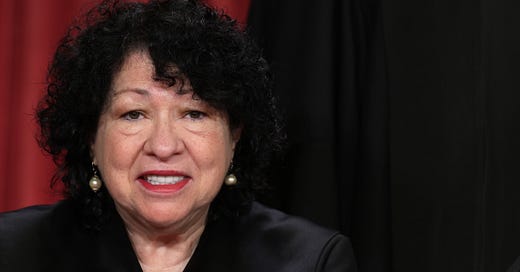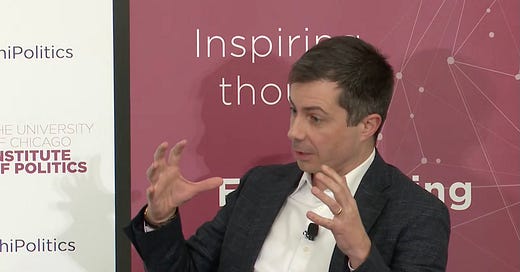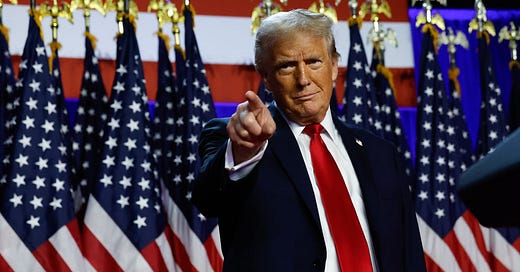
I Said Democrats Should Pander More, and Kamala Is Delivering
Kamala Harris's endorsements of some dumb populist economic policies (and also some smart ones) are good signs she is focused on winning. But she has more pandering to do on energy policy.
Dear readers,
I basically buy the Econ 101 model of prices and supply. When a product is in shortage, its price goes up to bring quantity demanded in line with quantity supplied. This price increase sends a signal to producers to make more stuff. If you cap prices, you get shortages — there isn’t enough of the demanded good to go around, and producers don’t have sufficient incentive to start making more of the good to meet demand in the future. So I don’t like price controls, I think “price gouging” is kind of an incoherent concept, and I don’t think there’s any fundamental reason of “fairness” that shortages shouldn’t be managed with price hikes. Yes, periods of shortage drive up profit margins — higher profits are part of what brings new producers into constrained industries, and in a robustly competitive market, those profit margins get competed down as supply expands. Price controls inhibit that process and are a bad idea.
So obviously, as a substantive policy matter, I’m not super keen on Kamala Harris’s new proposal to fight inflation through a new federal law on price gouging. My guess is such a law will be designed in such a way that it has little effect on the market, but it does have effects on the market, they will tend to be negative, as with President Nixon’s price and wage controls in the 1970s.
All that said, Harris is trying to win a presidential election, and to win elections, you run on popular ideas. And the voters, in their infinite wisdom, strongly favor laws against “price gouging.” If you really feel like giving yourself a headache, I suggest reading this slide from Evan Ross Smith, pollster for center-left Democratic policy initiative Blueprint, showing voters’ opinions on various proposals to fight inflation. You will see that the two most popular ideas for disinflation — lower interest rates and lower taxes — are in fact inflationary. The third most popular idea, and the most popular idea that wouldn’t actually tend to push prices up, is to “prosecute companies for price-gouging and price-fixing,” as Harris will announce a plan to do tomorrow.
I spend a lot of time lecturing the left about the need to make compromises instead of demanding that campaigns be run on their loser policy ideas. Well, that lecture applies to me, too: The public demands action against “price gouging,” my objections to such laws are a political loser, and I should make peace with the fact that I won’t get my way on this issue. That is how democracy works.

Another proposal I’m gritting my teeth and putting up with is Harris’s echo of Donald Trump’s call to exempt tip income from taxes. This, again, is substantively a dumb idea: a waiter or bartender shouldn’t enjoy a lower tax rate than a salesperson or child-care worker or laborer who earns the same amount of income just because that income happens to come as tips instead of wages or business profits. A special tax break for only some kinds of workers creates economic distortions, is unfair, and grows the already-too-large federal budget deficit. Yes, Harris’s campaign has said she would add guardrails to Trump’s original idea, and those guardrails make the idea less dumb: her team told the Committee for a Responsible Federal Budget there would be an income limit and other provisions designed to ensure this benefit only goes to ordinarily-tipped employees in leisure, hospitality and gaming. Still, a less-bad policy is not a good policy.
That said, I can’t argue with the politics.
Harris’s shameless glomming-on to Trump’s pander to hospitality workers in the swing state of Nevada should be seen in the context of her shameless abandonment of the loser leftist positions she took in the 2020 primary, like banning fracking and imposing single-payer health care. Harris intends to fight Trump hard on the cost-of-living issue — as Axios describes, she is trying to break with Biden’s inflation record and position herself as a different kind of Democrat — and if that means making the tax code modestly less efficient,1 so be it. Better this than the Biden campaign’s complete flat-footedness on the cost-of-living issue that was on track to cost him the election.
I should note, by the way, that Harris’s choice to pair the no-tax-on-tips idea with a federal minimum wage increase — another popular and populist economic policy idea — is politically smart, too. And while minimum wage policies can be criticized in the same Econ 101 terms as price controls, in practice, I find it hard to spot negative economic impacts from minimum wages set in the typical range from the past few decades.
The main remaining complaint I have about Harris and her effort to get popular on the cost-of-living issue has to do with energy. Blueprint’s sixth-best polling policy on inflation — “increase energy production of all types” — happens to be one of the anti-inflation policies that would actually work. And Harris has made an important move in this direction by rescinding (via spokesperson) her opposition to fracking. But a more full-throated endorsement from Harris of an all-of-the-above energy strategy — similar to the kind of rhetoric we used to hear from Barack Obama during the 2012 campaign — would help fight one of Democrats’ biggest weaknesses on cost-of-living issues: that we are seen as the party that wants to make fuel more expensive. There is currently a compromise bill on permitting reform in the Senate that would make both fossil and renewable energy projects easier to build, increasing overall energy supply. I’d like to see Harris endorse it, and make that endorsement part of her pitch about how she really will fight to lower the cost of living, in a way that is different from Biden and other Democrats.
Of course, if Harris does this, she will take flak from left-wing climate activists, a group that is noisier and more feared within the Democratic Party than the economists who hate the ideas of price regulation and tip tax breaks. But she’s already shown a willingness to break with those activists by changing her fracking position. And taking attacks from the flanks is how you show voters you’ve really moved to the center.
I think Democrats generally understand that when Trump took criticism from anti-abortion activists for pushing the removal of a national abortion ban proposal from the Republican Party platform, the criticism was helpful to him politically. Our party would benefit from understanding that this dynamic works in the opposite direction, too — when we disappoint and annoy the purveyors of unpopular and extreme ideas on our side, that helps show persuadable voters that we are reasonable and normal. And the climate activists would do well to remember that in a democracy we can’t always get what we want, as I am currently reminding myself on the price gouging issue.
Very seriously,
Josh
Importantly, the Harris campaign says the tip-tax exemption would apply only to the personal income tax and not to the payroll tax. This greatly reduces the fiscal cost of the proposal because many lower-income tipped workers pay little or no income tax already. And keeping tips in the payroll tax base is important because Social Security benefits are calculated based on income that was subject to the payroll tax over the course of a worker’s career — it’s not practical to take tips out of the base because that would deprive many career tipped workers of a meaningful Social Security benefit in retirement.















This makes electoral sense and probably none of this will actually happen even if she's elected, but I insist on my right to be morose here.
I'm worried something big is happening here. The big problem the left in the US has always had is that middle-class taxes are way too low to support a European or Canadian-style welfare state, and the tax increases necessary would be toxic. Implement a double digit VAT on all items? Might as well propose poisoning all the ice cream. Bernie "solved" this problem in 2016 by simply promising a huge welfare state without any plausible plan to pay for it, and eventually this became mainstream thinking in the party. In 2020 the moderates wanted to throw $X trillion at every problem, Warren wanted $3X trillion, Sanders wanted $5X trillion. It was just nuts. But interest rates were low, inflation was a distant memory, and you could make a wrong-but-not-transparently insane argument that we could massively ramp up borrowing or even printing with no ill effect.
The fiscal environment is no longer hospitable to giant spending plans, even MMTards are admitting the deficit is too high, and so the left hasn't really had anything non-Gaza related to talk about. But I'm told that "neoliberalism is dead" these days so I think there will be a big push for hamfisted price regulation and micromanagement of the economy. Harris is at the moderate edge of this, but this could be the new direction for bad leftwing ideas.
But as a good illustration of where pandering can go really wrong consider Warren.
She still has her fans but I think a ton of people like myself liked her because she pretended to be who Hillary actually was -- a serious policy minded intellectual who had well thought out solutions -- but with less baggage. Hell that's why I was a fan initially
I know despise her almost as much as Trump and while my reaction is stronger than most others have also been alienated because they see that she keeps betraying that persona by outright lying to pander to some voters when she doesn't have to. I mean she could say here are some vague ideas for policies I'd like to develop but no she says "here's the text of the bill I'd pass" but if you actually read it critically you know damn well no former Harvard law prof actually thinks it's a good law.
When pandering starts to undermine your fundamental message about who you are it's not such a great idea. Luckily I don't think Kamala is there.